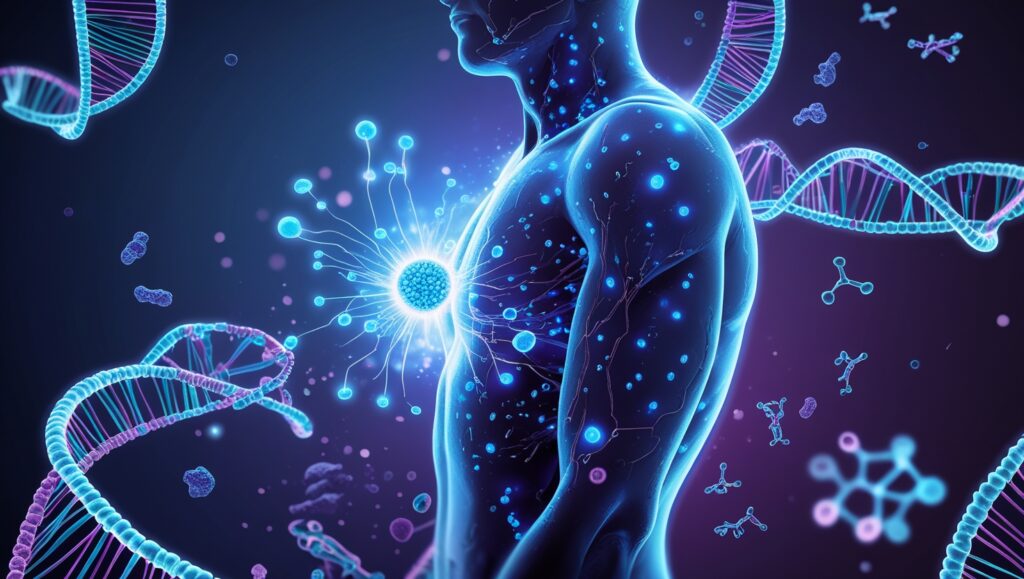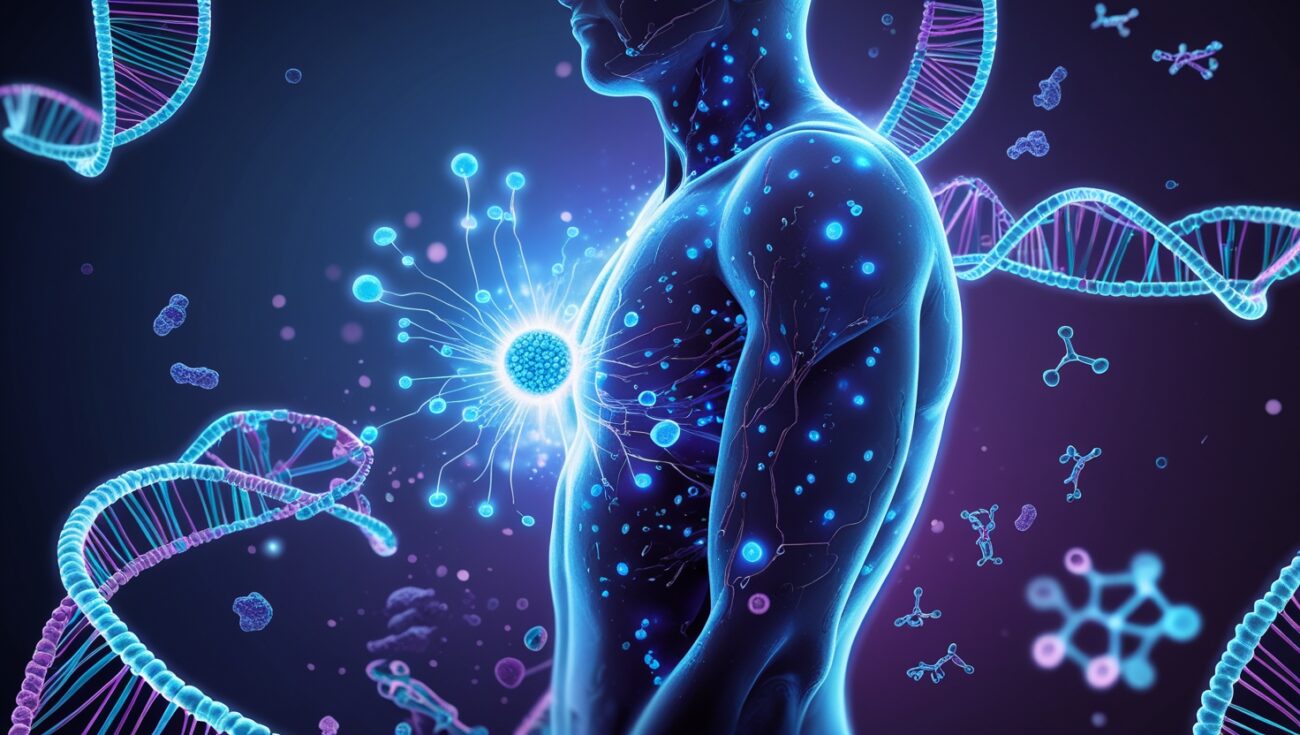How to Repair Cellular Damage from Stress and Burnout Naturally
Stress doesn’t just make you feel exhausted—it actually damages your cells. Over time, chronic stress and burnout break down your body at the cellular level, draining your energy, weakening your immune system, and even speeding up aging.
But there’s good news: your body wants to heal. You just have to give it the tools. Here’s how to repair cellular damage caused by stress and burnout—naturally, and without prescriptions.

Table of Contents
What Is Cellular Damage and How Does Stress Cause It?
When you’re under chronic stress, your body produces excess cortisol, which creates inflammation and oxidative stress. That stress overwhelms your mitochondria (your energy centers) and leads to:
- Depleted ATP production (low energy)
- Damaged DNA
- Impaired detox and recovery
- Hormonal imbalances
This is why stress makes you feel tired, foggy, moody, and physically drained.
The Mitochondria Are the First to Break Down
Your mitochondria are tiny power plants in your cells. They’re responsible for producing the energy your body needs to function. Under stress, they get overwhelmed and stop working properly. That’s why repairing them is step one in reversing burnout.
What Worked for Me: Natural Cellular Repair
After months of burnout, I started taking a mitochondrial support supplement with:
- CoQ10 – protects and restores mitochondrial function
- PQQ – regenerates new mitochondria
- Magnesium – calms the nervous system and supports over 300 energy reactions
- Nicotinamide Riboside (NR) – boosts NAD⁺, a key molecule for recovery
- Acetyl-L-Carnitine – improves mental focus and cell metabolism
This is the exact supplement I take daily — it helped me regain focus, energy, and emotional stability.
How to Repair Cells Naturally (No Prescriptions Needed)
- Sleep in total darkness – melatonin is a powerful mitochondrial protector
- Reduce caffeine – it masks fatigue but worsens energy debt
- Eat healthy fats – like avocado, salmon, and olive oil for membrane repair
- Take a targeted supplement – for real mitochondrial restoration
- Meditate or walk daily – to lower cortisol and reduce oxidative stress
- Hydrate – cellular repair needs water and electrolytes
- Get morning sun – regulates circadian rhythm and supports NAD⁺
The Role of NAD⁺ in Burnout Recovery
NAD⁺ is a molecule that helps cells repair themselves. Low NAD⁺ is common in people with chronic stress, poor sleep, and fatigue. Supplementing with NR (nicotinamide riboside) helped me:
- Recover faster from mental stress
- Sleep more deeply
- Feel like “myself” again by week two
I get it through this supplement right here
How Long Does Cellular Repair Take?
Some people feel better in 7–10 days. For deeper recovery, give it 30–60 days. Your body is constantly repairing—but it needs the right nutrients, rest, and support to do it fully.
Why Multivitamins Aren’t Enough
Generic multivitamins don’t provide the bioavailable nutrients needed to repair mitochondria. Most don’t include PQQ, NR, or CoQ10 in effective doses. That’s why so many people still feel tired even while taking “all the right vitamins.”
The Burnout Cycle Is Real—But Reversible
When your cells don’t have energy, everything suffers:
- Focus drops
- Mood swings increase
- Motivation disappears
- Sleep becomes light or broken
But once your cellular systems are recharged, everything starts working again—naturally.
What I Noticed After 10 Days of Mitochondrial Support
- Morning clarity and alertness returned
- I felt calmer and less reactive
- No more daily energy crashes
- My workouts didn’t wipe me out
- I started waking up actually rested
This is the one I now recommend to anyone dealing with stress and fatigue
You’re Not Broken—Your Cells Just Need Help
Burnout isn’t laziness. It’s biology. But the body can bounce back fast when supported correctly. Start with your cells, and your energy, mindset, and motivation will follow.
Give your body the cellular support it’s been missing and start your recovery today—naturally, from the inside out.
What Stress Really Does to Your Cells (Beyond Fatigue)
Stress isn’t just mental—it triggers a biological storm. It floods your body with cortisol and adrenaline, which over time damages your DNA, shortens telomeres, and disrupts your body’s ability to repair itself. That’s why chronic stress can age you prematurely—and why cellular repair is the only real fix.
The Link Between Burnout and Mitochondrial Dysfunction
Mitochondria are responsible for turning food into fuel. But when you’re under nonstop stress, they slow down or shut off. This leads to what many call “invisible burnout”—when everything looks fine on the outside but you feel like you’re dragging through life.
Can You Really Reverse Burnout Naturally?
Yes—when you stop focusing on just managing symptoms (like sleep or mood) and start rebuilding your body’s energy engine. Burnout is reversible, but only when you target the mitochondria, nervous system, and inflammation all together.
Why Adaptogens Aren’t Enough
Adaptogens like ashwagandha and rhodiola are helpful, but they only support stress response—not deep energy repair. They don’t fix the ATP deficit or rebuild damaged cells. That’s why I now rely on a complete formula that includes mitochondrial boosters.
This is the one that finally worked for me
Signs You’re in Cellular Burnout (Even If You Sleep)
- Needing caffeine to function
- Waking up tired after 8 hours
- Irritability or emotional numbness
- Constant overwhelm
- Sensitivity to noise or people
These are not “personality flaws”—they’re biological red flags.
ATP: The Fuel Burnout Steals From You
ATP is the energy currency of your body. When you’re stressed, your body burns through it faster than you can produce it. That’s why you crash, snap easily, or feel like your brain is “offline.” Boosting ATP production is critical for healing from burnout.
Repairing Cellular Damage with Nutrition
Foods rich in omega-3s, antioxidants, B vitamins, and magnesium are essential for mitochondrial repair. But most of us can’t get enough through diet alone—especially during burnout. That’s where the right supplement can close the gap and jumpstart recovery.
The Difference Between Stimulants and Cell Repair
Energy drinks, caffeine, and sugar stimulate your brain, but they don’t heal. They pull from your already low reserves. True recovery comes from nourishing the cells, not hyping the nervous system. It’s a restoration strategy, not a quick fix.
How Emotional Stress Destroys Physical Health
Emotional stress releases chemicals that can weaken your gut, suppress your immune system, and inflame your brain. Mitochondria are highly sensitive to these changes. That’s why burnout often comes with anxiety, gut issues, and memory problems—all at once.
Mitochondrial Support Can Improve Your Hormones
Cellular fatigue affects your adrenal glands, thyroid, and sex hormones. Once I began supporting my mitochondria, I noticed my mood, cycle, and focus naturally improved—without needing hormone therapy or antidepressants.
How Long Until You Feel the Difference?
For me, it took about 7 days to notice a lift in my energy and mood, and about 3 weeks to feel stable and mentally focused again. But results vary. The key is consistency and using a high-quality, clinically dosed formula.
This is the one I personally recommend
The Smart Way to Start Your Burnout Recovery Today
Don’t wait until your body forces you to stop. Start small—support your cells, hydrate more, reduce screen stress, and use supplements that target the real root of burnout. You don’t need to suffer silently anymore.
Start your cellular repair here and give your body what it’s been begging for.

